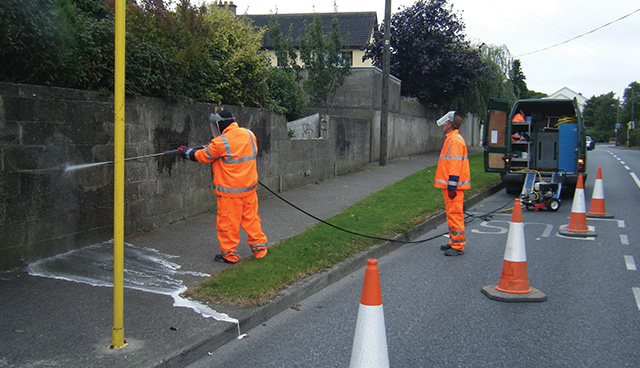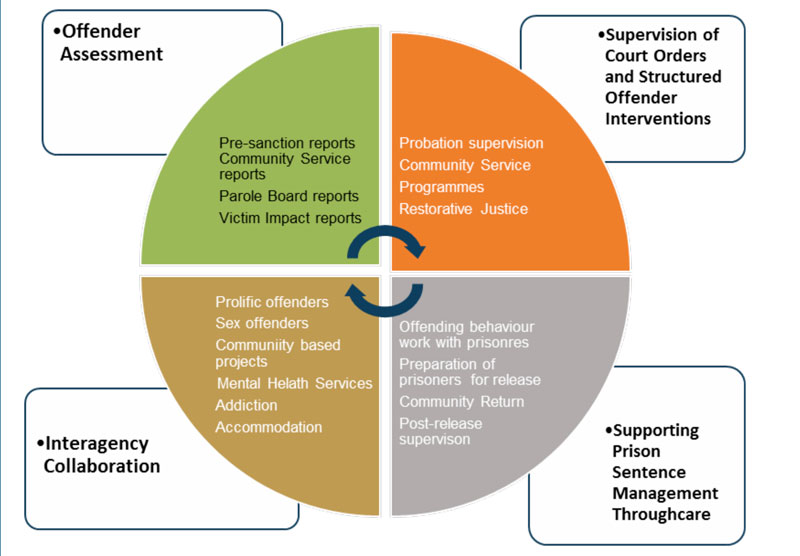Unlocking the capacity to change


Across the Probation Service, staff share a belief in an individual’s inherent capacity to change and work to motivate and support this change, Vivian Geiran, Director of the Probation Service, writes.
Making the difference
Probation Service staff are skilled, professional agents of change. While those refered to us by the courts generally start out as involuntary service users, we work hard to engage them as “clients”, or customers in their own change progress towards desistance from crime.
Robbie, 23 years old, currently on probation and known to the Probation Service since his early teens said: “I didn’t think it [probation] would work, I was locked up so many times. I have now been out of trouble for three years.” Change is often difficult and complex. It requires ‘staying power’ on the part of the worker and the client and is fuelled by the belief that people can turn their lives around.
John completed the Choice and Challenge programme. “Having made progress in addressing his drug use he began to mend significant relationships, particularly with his family. He also secured a place on a vocational training programme with one of the Probation funded Community Based Organisations,” his probation officer Liz said.
A learning organisation
Creating a culture of continuous learning and reflective practice for all staff is a key priority to ensuring that we achieve better outcomes for service users and the wider community.
As part of career development and performance management planning, all staff are supported in identifying training requirements to ensure that they receive the relevant core training for that role.
Annual schedules of training are designed to reflect strategic priorities, whilst ensuring that the content is responsive to new and emerging practices and to findings from criminological and other relevant research.

Training is provided by the in-house Learning and Development Unit, complemented by organisational practitioner trainers and contracted external subject experts. Some events are facilitated on an interagency basis. Schedules combine e-learning, face-to-face experiential sessions, information events and ‘lunch and learn’ gatherings to respond effectively to staff needs and to ensure the creative and efficient use of resources.
Evidence-informed practice
The Probation Service is committed to implementing best quality practice and interventions supported and informed by evidence and evaluation to help create a safer, fairer and more inclusive Ireland.
Research helps us to understand service users’ risk and need levels and to drill down into the impact of our interventions.
This enables us to prioritise and target our resources and adjust interventions as appropriate. Our research studies on drug and alcohol misuse amongst offenders for example, provide important data in addressing one of the most critical contributory factors to offending.
The continuous development of the organisation and its staff is complemented by building systems to ensure the appropriate collation and analysis of data in order to inform effective and targeted service delivery; in other words, providing the right service to the right people in the right place at the right time, so as to reduce reoffending.
In conjunction with the Central Statistics Office, the Probation Service is currently preparing for publication of the third study on the impact of Probation interventions on rates of recidivism.
Earlier studies have found that almost 60 per cent of offenders on Probation supervision had no convictions for a further offence committed within three years of the imposition of a Probation or Community Service Order.
Stronger and more effective together
Informed collaboration is central to what we do, beginning with the strong and collaborative relationship with the service user. This also extends to a range of stakeholders across the criminal justice system, to communities and victims, as well as to academics in criminology and the social sciences, and across national and international boundaries.
The Community Return scheme that the Probation Service manages in partnership with the Irish Prison Service is an incentivised early release scheme that combines unpaid work for the benefit of the community with early release and resettlement support. The Joint Agency Response to Crime (JARC) prioritises high risk, serious and prolific offenders for interagency crime reduction programmes.
Evaluation of these unique initiatives found high rates of compliance and significantly reduced reoffending.
We are proud that Ireland currently holds the Presidency of the Confederation of European Probation (CEP), a body that provides leadership across European Probation organisations, in promoting professional, shared and integrated practice for fairer and safer communities. Mar a dearfá as gaeilge “Ar scáth a chéile a mhaireann na daoine.”
For more information:
E: psinfo@probation.ie
W: www.probation.ie
Twitter: @probation_irl






